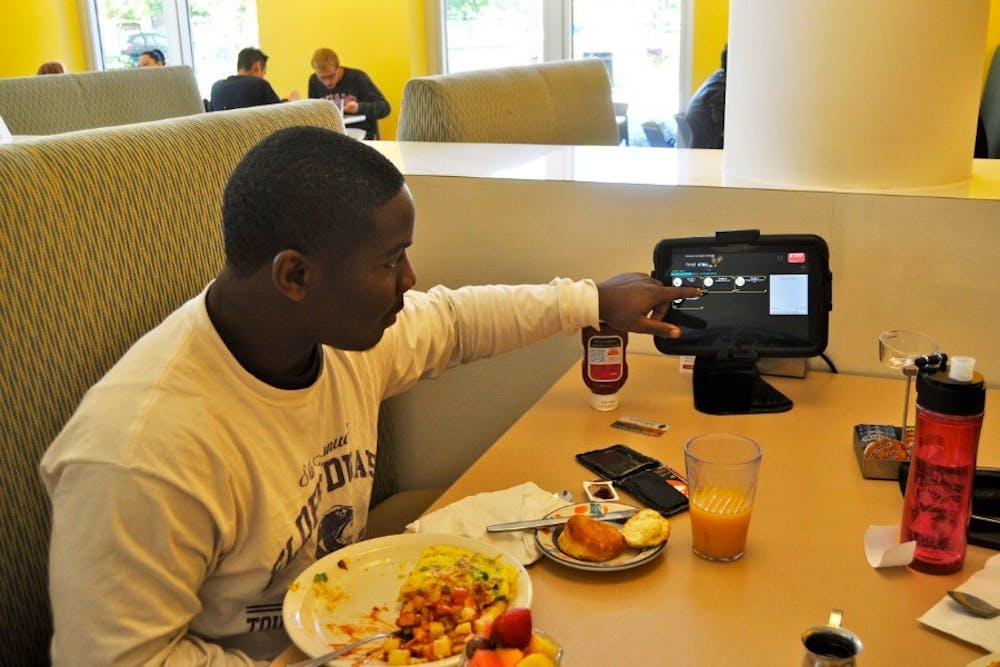First-year Chris Mattress takes advantage of one of the new touch screens to order food in First Stop on Tuesday, Sept. 23. First Stop is the first Miami dining center to offer electronic dining methods.
Photo by Kim Parent, For The Miami Student
By Kaelynn Knestrick, For The Miami Student
First Stop may not be the last stop for electronic food ordering at Miami University.
First Stop, the all-day breakfast restaurant at MapleStreet Station and in the West Lobby of Harris Dining Hall, is the only dining facility on campus that has students order and pay on iPads. Although it is the only dining hall that uses this system, it is also one of a select few who have workers serve students restaurant-style.
Since First Stop is one of the only dining options with a full service setup, rather than a stop-and-go process, it was given the iPads for placing orders, Manager of Culinary Services Mary Barrera said.
"I love actually being able to serve people," sophomore First Stop employee Andy Tu said. "The only difficult part is that the cards don't always read and it takes multiple tries to be able to start someone's order."
Miami paid for the project using a budget specifically for electronic purchases and fees. The iPads were not funded by students' tuition dollars. Half of the project plan for First Stop was to be more high-tech and save on labor, and the other half was to produce faster service, Senior Director of Dining and Culinary Support Services Nancy Heidtman said.
Students either sit at a table with an iPad already stationed and ready to take an order or a server comes with a portable iPad to get the order. All tables serve drinks separately.
"I like being at the tables that allow you to order by yourself, it's invigorating," McElroy said. "It's nice not having to wait for someone to take your order. You can do it at your own pace."
Unlike traditional restaurants, at First Stop, you pay for your food before you order it. The dining services staff wanted the process to be as convenient for students as possible and to match the demands of students' workdays, Heidtman said
"We didn't want students to have to pay for a tip from theimeal plan," Barrera said. "We only want students to pay for their meals, not the service."
Students are not on a tip-based wage at First Stop; they all receive a regular pay of $8.35, just like the student employees at other dining locations on campus. There is the option to tip, but it is not required.
"It would be nice to have the ability to get tips, but families will often leave a cash tip," senior First Stop employee Sam Switch said.
"I enjoy having the iPad system. It's easier for us when people are able to order for themselves, especially when it is busy. The overall system works really well and it's a huge help in keeping things smooth for servers and for the cooks."
Also, unlike regular dine-in restaurants, once students are finished with their meals, they can simply leave. Since they paid for their meals beforehand, they do not have to wait for a server to stop by with the bill before they are free to go.
"I like that you can leave once you are done eating," first-year Ella Brumitt said. "You are able to leave on your own time instead of having to wait on the waiter."
First Stop is the beginning, but not the end of electronic ordering at Miami. This system will be introduced at Pulley Diner in the next semester and the culinary service has the goal of taking this system as widely across campus as they can. Funding will limit how many places can receive the electronic system.
Another goal is for kiosks, or remote ordering, to be implemented at Armstrong Student Center to help cut down lines and make overall service better and more efficient, Heidtman said.
"There is always good, bad and ugly parts of things, but our goal is to provide students and any customers with the best service they can have," Heidtman said. "After all, students live with us and it is our responsibility to offer variety, quality and healthy optionsto eat."

